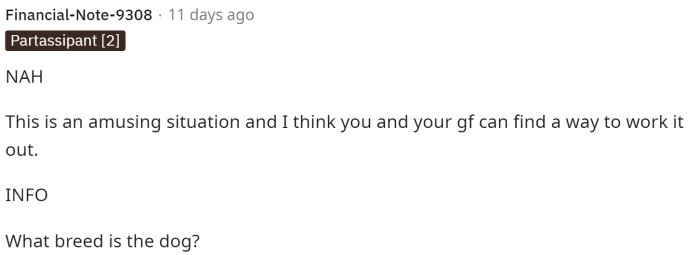Boyfriend Tells His Girlfriend That He Doesn't Like Her Dog Because of How It Acts Around Him and Makes Him Uncomfortable
We're back with another AITA thread post from Reddit, and this one features another dog story, but this time it's a little different. First off, the vote ended up being something we don't see very often on Reddit, which already makes us excited to look into the comments to see what people had to say.
We enjoy covering these Reddit posts, and you all seem to enjoy reading them, so we figured we'd drop another one in here and provide some insight into this situation. We're looking into a boyfriend who tells his girlfriend that he doesn't like her dog due to the way it acts around him.
He goes into detail about why he feels uncomfortable around her dog and what happens if he does not like the dog. Despite things sort of getting better, he still feels this way and tells his girlfriend that he doesn't like her dog.
We have to respect people's likes or dislikes for certain animals, but also, the dog isn't doing anything necessarily bad. To hear more, you'll just have to keep reading to see the original post and all the comments left below it, which help to vote on whether or not he's wrong for this.
OP kept the post quite short and went straight into the details on why he feels uncomfortable and doesn't like her dog.

This first comment declares NAH and states that it would be a deal breaker for them if their partner didn't like their dog, but it also acknowledges that he has a right to not like her dog.

This comment is very similar to the one above, so clearly, people are already agreeing with each other in their responses.

Navigating Interpersonal Dynamics with Pets
Dr. Emily Carter, a psychologist specializing in human-animal relationships, notes that conflicts involving pets can often reveal deeper relational issues.
Her research suggests that discomfort around a partner's pet may stem from unresolved feelings of jealousy or insecurity.
This dynamic can be particularly pronounced when one partner feels that their needs are being overshadowed by the pet's presence.
Dog owners expect everyone to love their dogs as they do, but some people simply don't.

We just had to add this comment here because, obviously, OP mentioned that his girlfriend wasn't speaking to him.

Simply put, he's NTA at all, but really there are NAH because neither is necessarily doing or saying anything wrong.

According to a study published in the Journal of Applied Animal Welfare Science, pets often serve as emotional support for one partner, potentially leading to feelings of neglect in the other.
This situation can create a sense of competition for affection, complicating the dynamics of the relationship.
This comment states that this is an amusing situation, but they believe that they'll be okay working it out. Also, the breed of dog is a German Shepherd.

Pretty much everyone is saying the same thing about this situation, so it's up to them what happens next.

It is totally normal dog behavior, but typically dog behavior that people don't exactly enjoy.

Understanding Boundaries and Comfort Levels
Research from the American Psychological Association emphasizes the importance of establishing boundaries around pets in relationships.
When couples discuss their comfort levels and preferences regarding pets, it can lead to a stronger understanding of each other's emotional needs.
This proactive approach can help mitigate misunderstandings and create a more harmonious living environment.
This comment was very straightforward and blunt, but if he's not okay with the dog, then it definitely might be true.

This comment articulated it well, and we have to agree because this is exactly what should and will happen.

The actual vote was NAH, and we have to agree with this because he doesn't have to like the dog, but it's also normal for her not to want to be with him if he doesn't like the dog since that's her dog. Ultimately, we don't know what will happen, but nobody is in the wrong for it.
To address the discomfort, couples are encouraged to engage in open dialogues about their feelings toward the pet.
Practicing empathy and understanding each other's perspectives can foster a collaborative approach to managing the pet's behavior.
Additionally, considering training options for the pet may help alleviate tensions and enhance comfort for both partners.
Psychological Analysis
This scenario illustrates how pets can sometimes complicate interpersonal dynamics, revealing underlying issues in the relationship.
It's crucial for partners to communicate their feelings openly to find a resolution that respects both individuals' needs.
Analysis generated by AI
Analysis & Alternative Approaches
In conclusion, navigating the complexities of relationships involving pets requires open communication and mutual understanding.
Research supports the idea that discussing boundaries and comfort levels can lead to healthier dynamics between partners.
Ultimately, prioritizing each other's feelings and preferences can foster a more supportive and fulfilling relationship.



